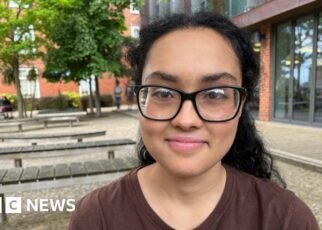[ad_1]
By Lucinda Adam, Political reporter, BBC Sussex
 BBC
BBCFor thousands of young people, 4 July will be their first time voting in a general election.
Among their key issues are climate change and university fees – but will they even cast a vote?
Brighton, Hove and Sussex Sixth Form College (BHASVIC) has been educating students on the importance of using their vote.
Student voting campaigner Shahama Anver said she was concerned politicians did not take young people seriously – and some policies impact them directly.
Ms Anver said: “There is a lot of legislation that impacts predominantly young people, even solely young people, and you can see that they’re doing for the benefit of older voters, which is a bit of snub really.”
Miss Anver added that young people were not considered properly by politicians “because we don’t turn up to vote, so it’s a bit of a vicious cycle really”.

Izzie Early has plans to go to university after she finishes her A-Levels and said she registered to vote as soon as she turned 18.
“Most important to me at the moment is talking about student loans and university tuition fees as well as the larger questions like housing and the jobs market.
“All of these things are so pertinent to young people but I feel like they aren’t actually talked about enough.”

Oliver Cornish already voted in the Police and Crime Commissioner elections, which he described as “quite underwhelming to be honest”.
He said climate change was important to him but he thinks climate issues are “sort of taped onto the bottom of a manifesto” for politicians.
“When you have massive intergovernmental bodies using terms like ‘it’s a code red for humanity” and talking about climate change in these massive existential level terms, it can feel like the Government doesn’t quite understand that.”

Joselyn Ryan is also a student voting campaigner at BHASVIC.
She said: “We’re a very politically active generation. You’ve seen it with the Black Lives Matter protests, with our Extinction Rebellion involvement.
“18-year-olds now need to take that formal step into politics.”

Millie Brown said political parties have been engaging with young people online.
She said: “I’ve definitely seen the political parties reaching out more on social media.
“Like they’re trying to reach young audiences through joking and memes and stuff.”
Jonathan Cox, from Citizens UK, said: “In our experience, young people are not apathetic about the issues, they’re often apathetic or have a sense of hopelessness or powerlessness about the processes themselves.
“When you enable young people to connect the things they’re passionate about, the things they want to change, with the democratic process, you suddenly see that apathy begin to disappear.”
[ad_2]
Source link




